The Council of Europe and the Southern Neighbourhood
Has the Arab Spring failed?
Many pose this question – including a July 2013 issue of the highly influential The Economist. As we witness dramatic events in Egypt and continued civil war in Syria, it is tempting to say that the Arab Spring has failed.
But like The Economist, the Council of Europe answers no.
Challenges remain formidable, but we are witnessing promising developments.
In July alone, the Council of Europe's legal experts, the Venice Commission, issued 40 pages of comments on the latest draft of the Constitution of Tunisia.
These experts praised the willingness of Tunisia's National Constituent Assembly to submit a final draft for review as ‘a result of long negotiations and intense judicial reflections.'
In its special Arab Spring feature, The Economist stressed that Tunisia's new constitution ‘could serve as a basis of a decent, inclusive democracy.'
Also in July, EU and Council of Europe officials reassessed the mid-point of an EU-funded multi-year Council of Europe initiative – the South Programme – to foster democracy in Tunisia, Morocco and in other countries of the southern neighbourhood. In this podcast, you can listen to progress achieved so far and plans for the future. with the Council of Europe's Giovanni-Battista Celiento.
Such cooperation with countries in the southern neighbourhood illustrates progress for positive change. For example, delegations from Morocco, Tunisia, Algeria and Jordan visited Strasbourg at the beginning of July to attend a seminar on conventions and partial agreements.
During those meetings, William Massolin, the Council of Europe's Tunisia-based national coordinator, assessed Council of Europe work in the Southern Mediterranean in this podcast, highlighting the Arab Spring as a crucial opening for the ‘Neighbourhood Strategy' launched by Secretary General Thorbjørn Jagland.
The Council of Europe has ‘tremendous experience not only in the constitutional field but also in reform of justice, education for democracy and in all the fields which are absolutely essential for a viable democracy,' said Massolin.
Furthermore, the Council of Europe's Parliamentary Assembly expressed satisfaction in its ‘first review of its partnership for democracy with the Moroccan Parliament' – two years after granting such status to the Moroccan Parliament.
During its June 2013 plenary session, the Assembly stressed the importance of continuing reform by adopting necessary constitutional laws and establishing planned governance structures so as to fully implement the democratic potential of the new constitution.
The Assembly will make a new assessment of the partnership within two years.
Arab Spring: overcoming violence and upholding women's rights
The assassination in February of Tunisian opposition leader Chokri Belaid drew worldwide condemnation as a dangerous detour on Tunisia's path to democracy. It seemed further proof that the flower of the Arab Spring has become wilted.
But despite the violence, efforts continue to promote democracy, the rule of law and human rights in the region. As Jean-Claude Mignon – president of the Parliamentary Assembly of the Council of Europe – proclaimed at the time: The assassination "will not lessen the resolve of the Tunisian people to consolidate democracy and the rule of law."
Several Council of Europe initiatives – in March alone this year – reflect continued resolve.
Members of the Council of Europe's Parliamentary Assembly met in Rabat to assess the progress of reforms in Morocco. The Council of Europe held a launching conference of a new School of Political Studies in Rabat. Also in Rabat, Council of Europe drug policy experts organised a round table for a national drug prevention strategy in Morocco. Societal challenges like drug abuse can be more threatening in times of transition.
In Tunis, representatives of the Council of Europe's Venice Commission – an independent group of legal experts who hold four annual plenary sessions there – participated in a symposium on reforming Tunisia's judiciary, focusing on its independence. Members of Tunisia's Constituent Assembly meet regularly with Venice Commission representatives to assess progress for the country's new constitution. (more...)
The Council of Europe supports women’s rights in Africa and the Middle East
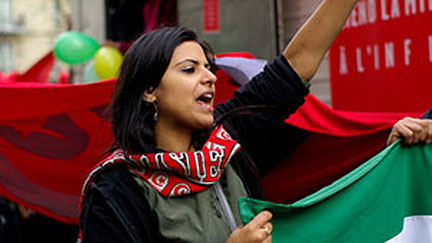
Women took a stand for civil society across the region and strove for a new sense of equality, long suppressed under old, patriarchal regimes.
"By offering a platform to speak out for women's rights, the Council of Europe plays its part to keep women's rights in Arab Spring countries in focus", said author and journalist Souhayr Belhassen, joint winner of the Council of Europe's North-South Prize this year. During a visit to Strasbourg on 12 March 2012, she highlighted a petition published worldwide and signed by thousands of people – including celebrities – urging Arab Spring countries to treat women with dignity, equality and respect.
On the occasion of women's day, Council of Europe Secretary General Thorbjørn Jagland said: "It is important for all of us to recognise the contribution of women in driving progress and reform, and it is essential that women's voices are now heard in building new Arab societies, and in fighting discrimination and stereotypes. If women are again left out, the promising Arab Spring could become a new winter."
© Antoine Walter / Tunisia, 15 January 2011
Supporting judicial reforms in the countries of Southern neighborhood – Cooperation with Tunisia
In the framework of the Joint Programme of the Council of Europe and the European Union - "Strengthening democratic reform in the countries of Southern neighborhood ", the co-operation between Tunisia and the European Commission for the Efficiency of Justice (CEPEJ) enters in its first operational step.
A group of CEPEJ experts went to Tunis on 19-21 November 2012 to meet with officials from the Ministry of Justice and representatives of judicial professions. A report on the functioning of the Tunisian judicial system, and a list of co-operation activities to be implemented under the Programme with a view to improving the quality and efficiency of judicial services, will be issued in January 2013.
Equality after the Arab Spring – women call for change at Parliamentary Assembly
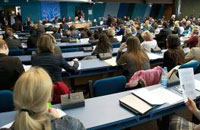
As proposed by the rapporteur, Fatiha Saïdi (Belgium, SOC), the PACE also invites the countries of the region "to consider the prospects for parliamentary dialogue offered by the status of Partner for Democracy, the Moroccan parliament having been the first to be granted this status in June 2011.
Lastly, the Assembly welcomes the initiatives taken by the Secretary General and a number of Council of Europe bodies to establish closer dialogue with the countries of the region, especially Morocco and Tunisia. It calls on the Committee of Ministers to pursue this course of action through political dialogue and country-specific action plans – drawn up in consultation with the authorities of the countries concerned – whilst ensuring that gender equality and the enhancement of the status of women are high priorities.
- Hearing on "Women in the Arab Spring" (video)
- Speech by Bassima Hakkaoui (video)
- Adopted texts
Tunisia and Morocco in focus
The Arab Spring is particularly relevant to the Council of Europe's immediate neighbours and Tunisia and Morocco have expressed their interest to strengthen co-operation with the Council of Europe, by identifying priority lines of co-operation and setting-up joint activity programmes.
Agreed in January 2012 between the European Union and the Council of Europe, a three-year project worth €4.8 million supports co-operation priorities, primarily with these two countries, in the fields of the independence and efficiency of the judiciary, the fight against corruption and human trafficking and the promotion of democratic values.
During meetings with government officials in Rabat and Tunis in early April 2012, Secretary General Jagland outlined the main elements of the new Council of Europe neighbourhood policy, which includes human rights issues tied to women's rights.
"Countries in the Arab region have asked for expert advice from the Council of Europe in a number of areas, such as constitutional reform and judicial and electoral reform, and we stand ready to assist", Jagland stressed during the visits.
Parliamentary Assembly agenda to focus on the Arab Spring
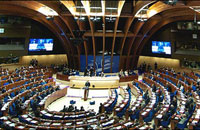
A hearing to focus on women's rights in the Arab Spring will be held with the participation of Mr Jean-Claude Mignon, President of the Parliamentary Assembly of the Council of Europe. Participants will include:
- Saad-Eddine El Othmani, Foreign Affairs Minister of Morocco,
- Tina Acketoft (Sweden, ADLE), President of the Equality Commission,
- Pietro Marcenaro (Italy, SOC), President of Political Committee,
- Maud de Boer-Buquicchio, Deputy Secretary General of the Council of Europe,
- Ms Gamila Ismail, political activist and journalist (Egypt);
- Ms Sara Maziq, activist, Representative of Women4Libya and founder of Libyan's Civil Society Organization (Libya);
- Ms Rima Flihan, activist and writer (Syria);
- Ms Sarah Ahmed Jamal, co-founder of Support Yemen, activist and researcher (Yemen).
Furthermore, Fatiha Saïdi (Belgium, SOC), a member of the Committee on Equality and Non-Discrimination of the Parliamentary Assembly, made fact-finding visits to Casablanca and Rabat (15-18 February) and Tunis (19-21 February), in connection with the preparation of her report in April on "Gender equality and the status of women in the Council of Europe southern neighbourhood".
Her report will be debated and voted on during the April session.
Syria: Assembly welcomes the emergence of a common position within the international community
Strasbourg, 26.04.2012 – Following an urgent debate on the situation in Syria, the Parliamentary Assembly of the Council of Europe (PACE) firmly condemned the gross human rights violations committed by Syrian military and security forces. It also expressed regret at the continuing violations of the ceasefire implemented under Kofi Annan's peace plan and the increasing number of deaths. PACE equally condemned the human rights violations committed by some armed groups combating the regime.
At the same time the Assembly expressed satisfaction that a "common position is gradually emerging" within the international community with the unanimous adoption of two United Nations resolutions on 14 and 21 April 2012, authorising the deployment of unarmed UN military observers to Syria to report on the implementation of a full cessation of armed violence.
The parliamentarians also stressed that the implementation of Kofi Annan's peace plan and the total cessation of violence should ultimately guarantee democratic change in Syria, gradually creating conditions allowing for a "Syrian-led political process" and eventually for free and fair elections. (more...)
Read also:
King of Jordan meets with Secretary General
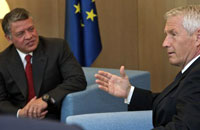
Co-operation has been proposed in the field of constitutional justice and electoral assistance through the Council of Europe's Venice Commission, to support the reform of the judiciary, take action regarding freedom of expression and media freedom, promote youth participation – and support women's empowerment and women's rights.
Secretary General Jagland and King Abdullah also discussed issues in international relations in the Organisation's southern neigbourhood, and the potential for the Council of Europe to use its instruments to build confidence there. The Secretary General will visit Jordan, Palestine and Israel at the end of May.
Calling for women’s rights in Lebanon
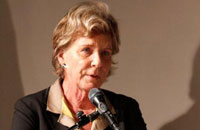
"All women in Lebanon have the right to live free from violence. This right should not depend on their social, cultural or religious background". Speaking at a Conference organised by the French Embassy in Lebanon, Deputy Secretary General Maud de Boer-Buquicchio supported the call of civil society representatives who expressed concern about the role played by the various confessional laws and courts in the country which in many cases resulted in discrimination against women.
The Conference took place against the background of a public debate on a law on domestic violence that will be soon examined by the Lebanese parliament. In her exchange of views with the members of the parliamentary commission preparing the draft law, the Deputy Secretary General welcomed the recent removal of the justification for the so called "honour crimes" from the criminal code and the preparation of a national human rights action plan including an independent human rights institution. She encouraged the commission to seek inspiration in the Council of Europe Convention on preventing and combatting violence against women and domestic violence.
During her very constructive meetings with Prime Minister Nagib Mikati, Minister of Justice Chakib Cortwabi, and with the President's adviser, Elie Assaf, she raised some of the other human rights concerns in the country, including the situation of Palestinian and Syrian refugees, death penalty, torture and prisons conditions and encouraged the Lebanese authorities to make use of international and Council of Europe standards in a number of fields.
Other Council of Europe initiatives continue in Arab Spring countries, including the work of the Council of Europe's Venice Commission, which recently welcomed a delegation of Tunisian members of the Constituent Assembly. The Venice Commission is playing a key role in helping Tunisia draft its new constitution and offers advice to the new government on matters related to constitutional guarantees of human rights – including gender rights – and judiciary power.
The Council of Europe's Drug Policy Network, also known as the Pompidou Group, is supervising a new project on gender-oriented care of substance dependent women in Egypt. The size and the nature of addiction problem in women has not yet been studied in detail, and no specialized service in Egypt for the care of addicted women exists. But the Drug Policy Network, via its MedNet programme, fosters cooperation and exchange of information between North African and European countries. Independent experts provide their expertise and experience.
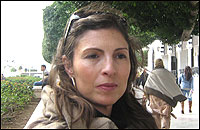
An award-winning journalist, Olfa Belhassine is not only a top reporter for the Tunisian daily "La Presse", but has also published articles on the Arab Spring this year in major French publications including "Le Monde" and "Libération".
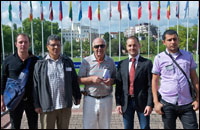
A television crew from Tunisia's national television station El Watania travelled to Strasbourg in August 2011 to report on the Council of Europe's role in Tunisia's transition to democracy.
Slaheddine Ben Mbarek, producer; Hassen Godbane, director ; Mehdi Ben Ammar, cameraman and Mahjoub Hammami, sound engineer, of the Tunesian national television station. With Gaël Martin-Micallef of the Venice Commission, before the Palais de l'Europe on 10 August.

